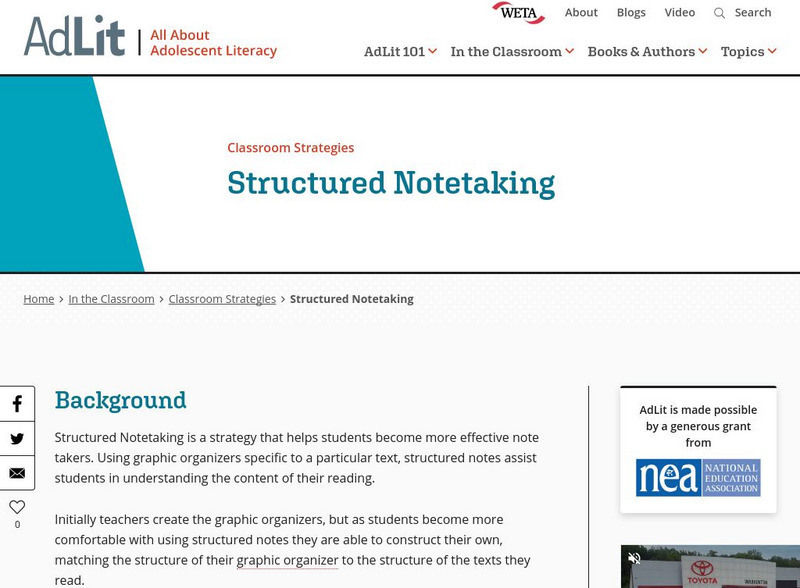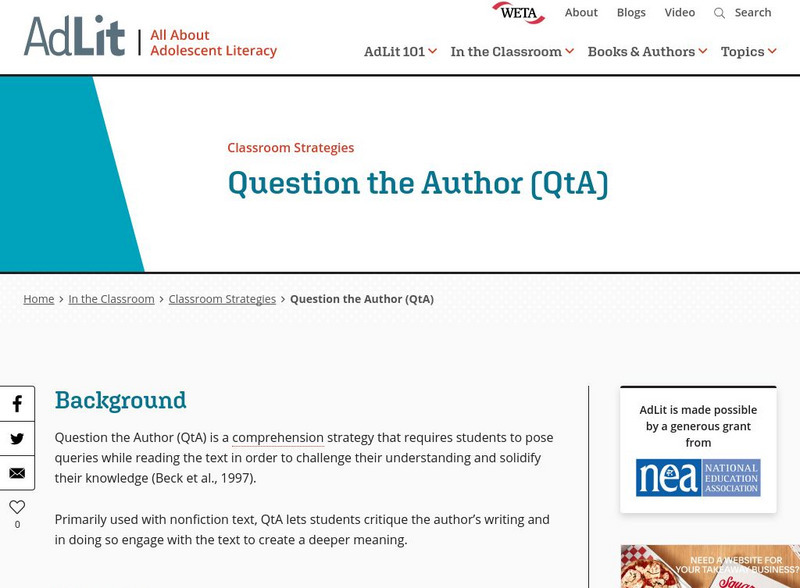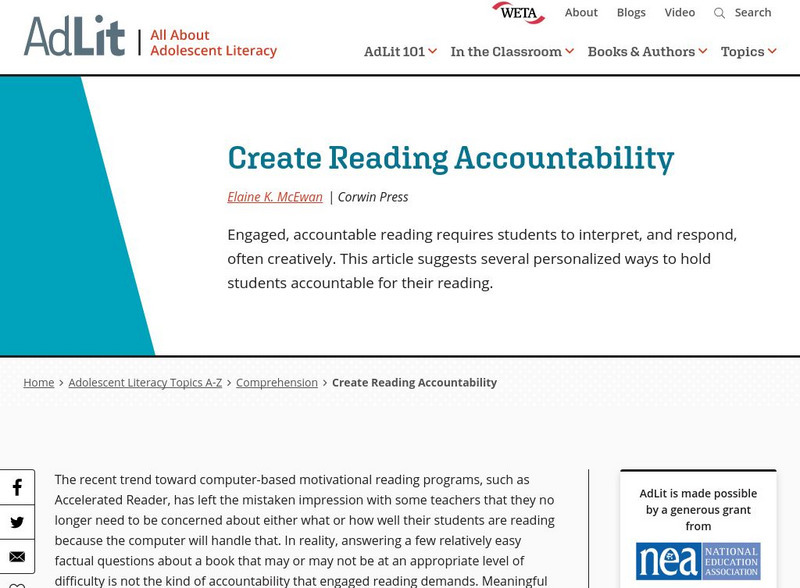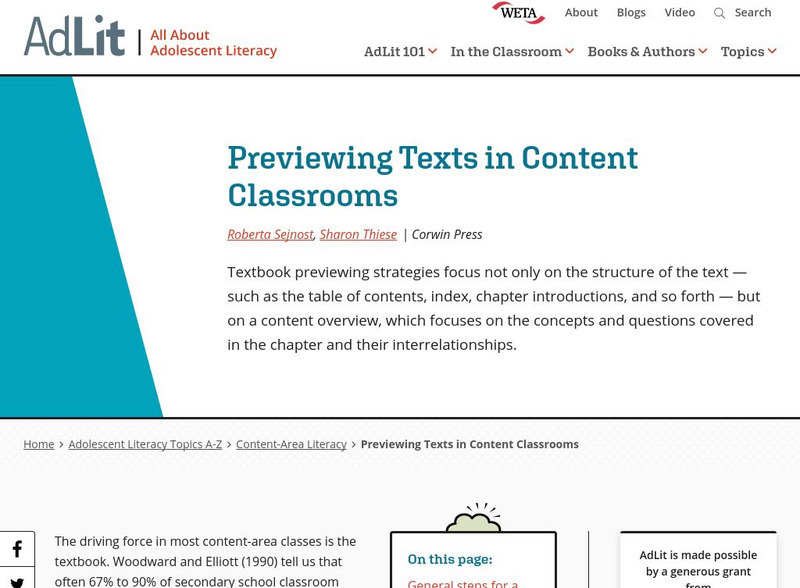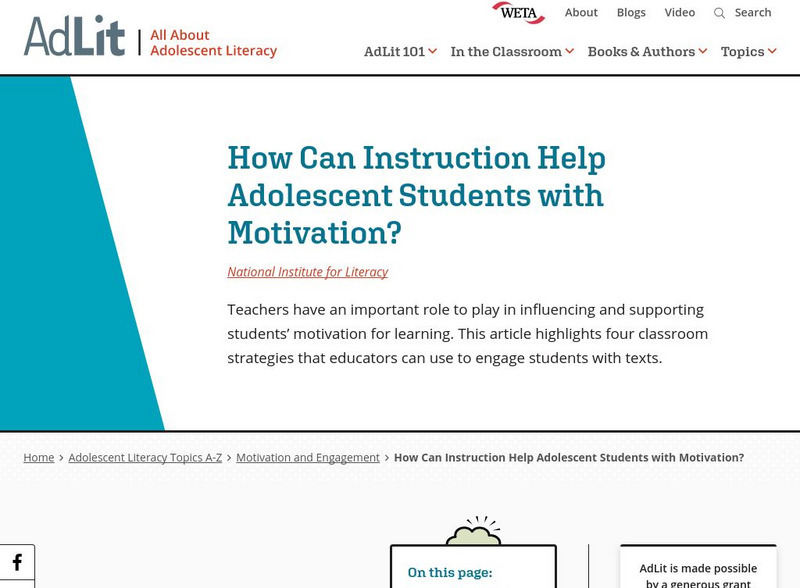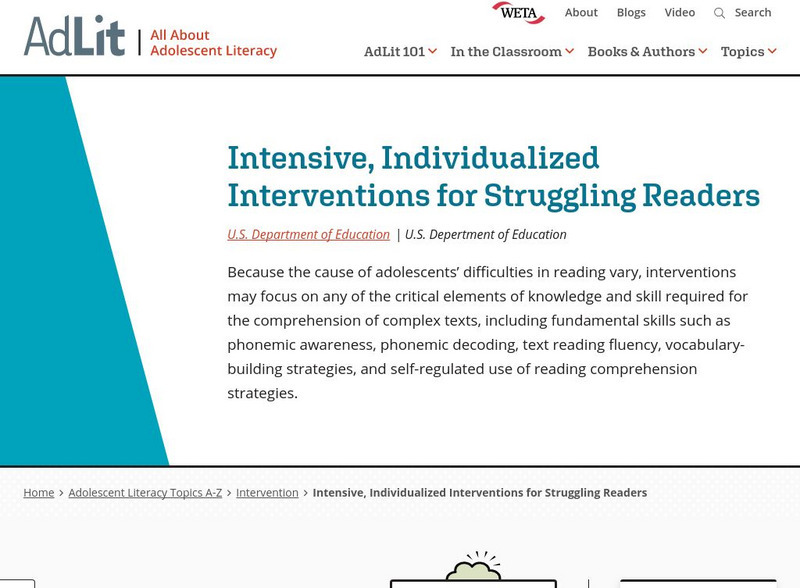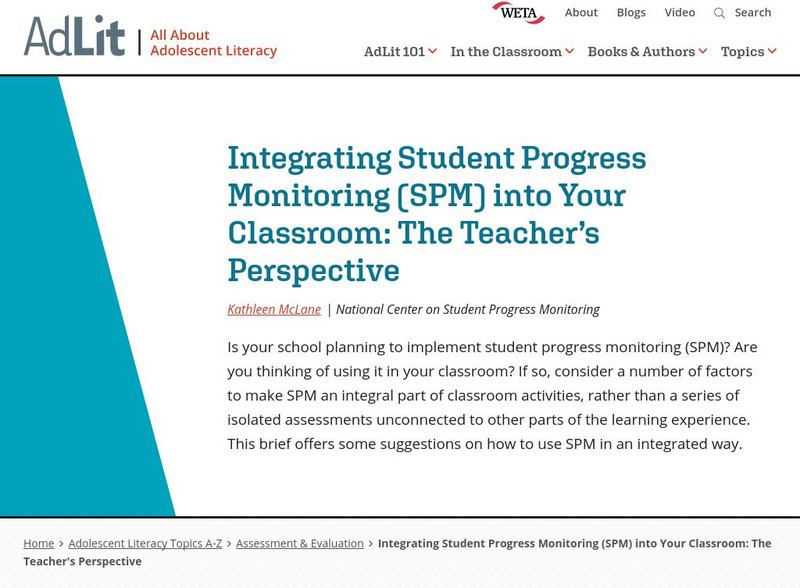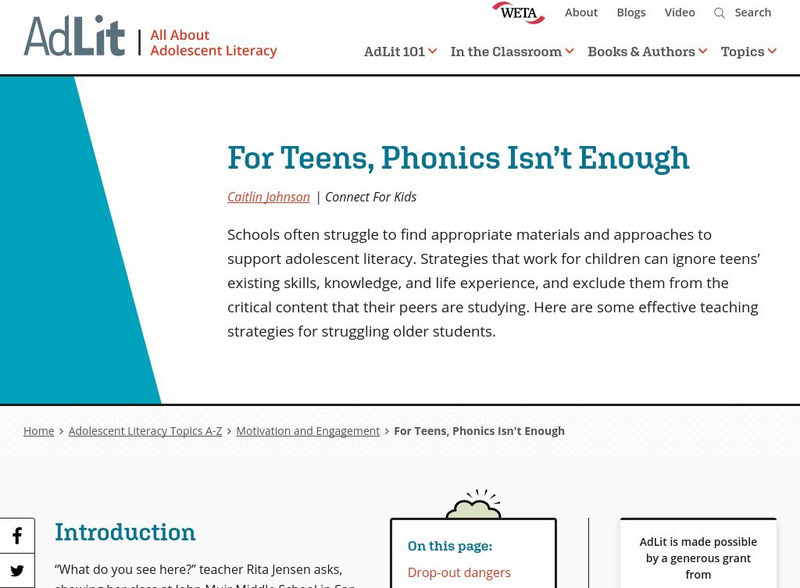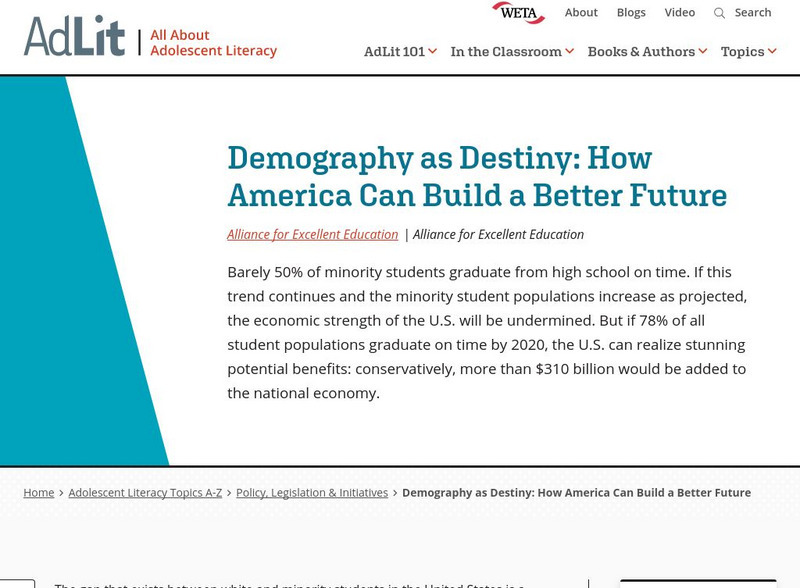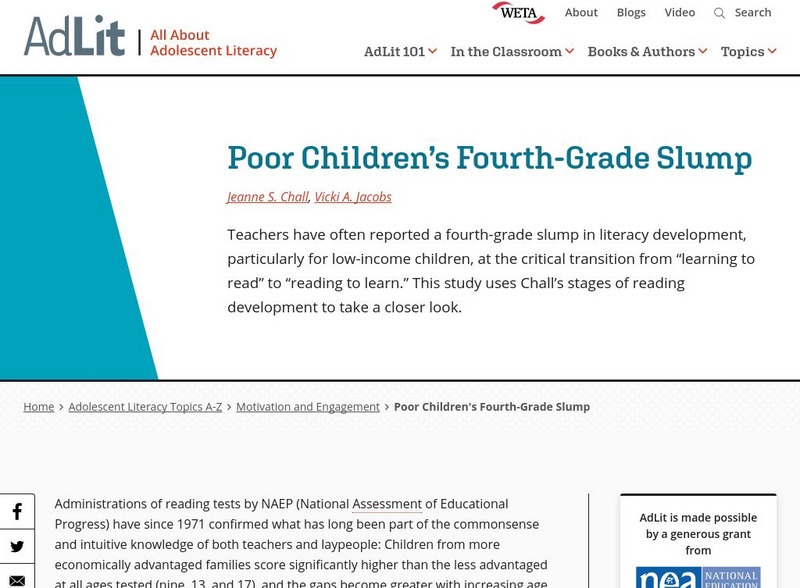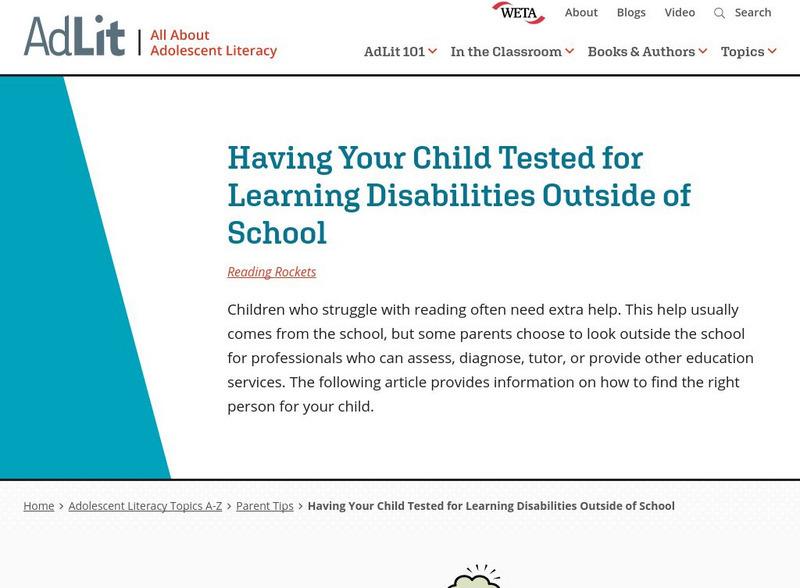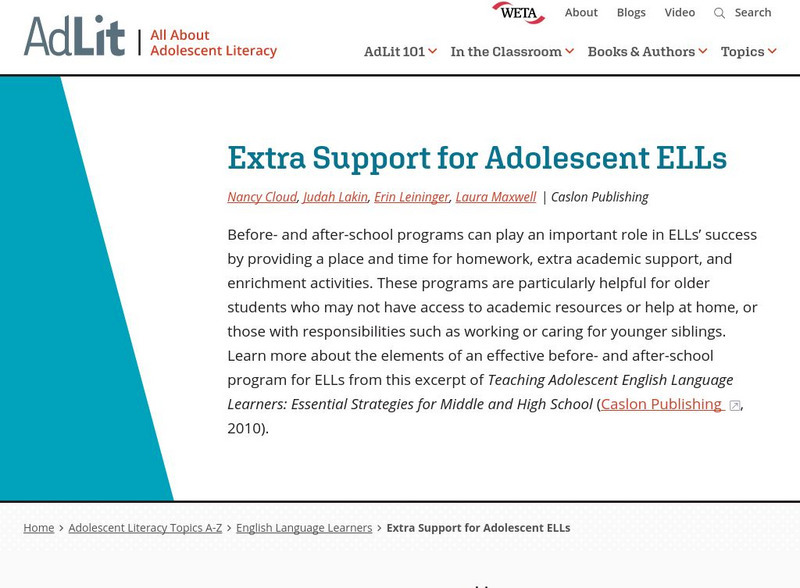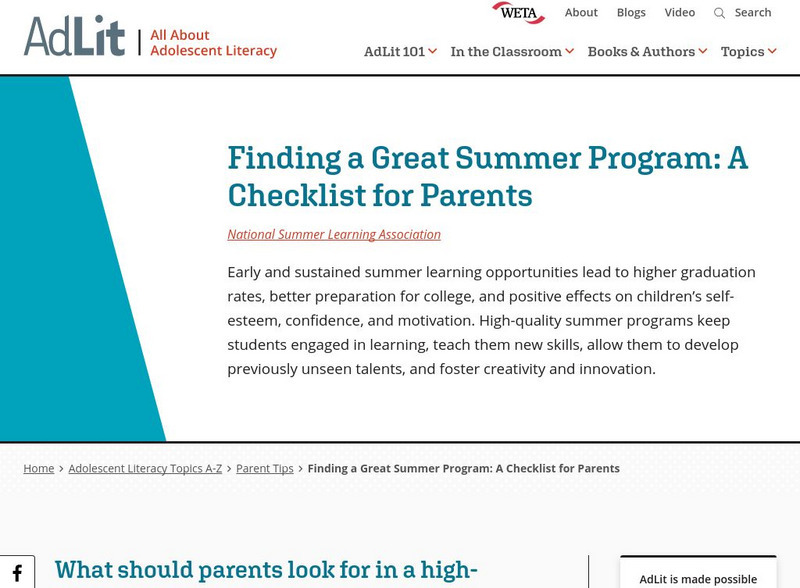AdLit
Ad lit.org: Classroom Strategies: Structured Notetaking
Structured Notetaking is a strategy that helps students become more effective note takers. Using graphic organizers specific to a particular text, structured notes assist students in understanding the content of their reading.
AdLit
Ad lit.org: Classroom Strategies: Sq3 R: Survey Question Read Recite Review
SQ3R is a comprehension strategy that helps students think about the text they are reading while they're reading. Often categorized as a study strategy, SQ3R helps students "get it" the first time they read a text by teaching students...
AdLit
Ad lit.org: Classroom Strategies: Word Hunts
Word Hunts are used to enhance students' vocabulary growth. Teachers ask students to look for words and patterns in reading materials based upon selected features. Word Hunts focus on the structure and meaning of words by turning...
AdLit
Ad lit.org: Classroom Strategies: Question the Author (Qt A)
Question the Author (QtA) is a comprehension strategy that requires students to pose queries while reading the text in order to challenge their understanding and solidify their knowledge (Beck et al., 1997).
AdLit
Ad lit.org: Classroom Strategies: Question Answer Relationship (Qar)
Question-Answer relationship (QAR) is a strategy to be used after students have read. QAR teaches students how to decipher what types of questions they are being asked and where to find the answers to them. Four types of questions are...
AdLit
Ad lit.org: Classroom Strategies: Raft Writing
RAFT is a writing strategy that helps students understand their role as a writer, the audience they will address, the varied formats for writing, and the topic they'll be writing about. By using this strategy, teachers encourage students...
AdLit
Ad lit.org: Create Reading Accountability
Engaged, accountable reading requires students to interpret, and respond, often creatively. This article suggests several personalized ways to hold students accountable for their reading.
AdLit
Ad lit.org: Previewing Texts in Content Classrooms
Textbook previewing strategies focus not only on the structure of the text - such as the table of contents, index, chapter introductions, and so forth - but on a content overview, which focuses on the concepts and questions covered in...
AdLit
Ad lit.org: Literacy Coaching in the Middle Grades
From time constraints to a de-emphasis on literacy to a limited research base, coaches in middle schools face challenges that do not exist in the elementary grades.
AdLit
Ad lit.org: How Can Instruction Help Adolescent Students With Motivation?
Teachers have an important role to play in influencing and supporting students' motivation for learning. This article highlights four classroom strategies that educators can use to engage students with texts.
AdLit
Ad lit.org: Intensive, Individualized Interventions for Struggling Readers
Because the cause of adolescents' difficulties in reading vary, interventions may focus on any of the critical elements of knowledge and skill required for the comprehension of complex texts, including fundamental skills such as phonemic...
AdLit
Ad lit.org: Enhanced Reading Opportunities Study: Key Findings
An overview of findings from the second year of the Enhanced Reading Opportunities (ERO) study, an evaluation of two supplemental literacy programs - Reading Apprenticeship Academic Literacy and Xtreme Reading - that aim to improve the...
AdLit
Ad lit.org: Expect Students to Activate, Connect and Summarize Daily
The activate, connect, and summarize daily routine can help struggling adolescent readers acquire new content. It consists of asking students to activate (what did we learn yesterday?), connect (draw a connection between your life and...
AdLit
Ad lit.org: Enhancing Outcomes for Struggling Adolescent Readers
With so much required of high schools today, there is little time or money to spend on the students who lack basic skills. This article presents important factors leading to success for struggling adolescent readers, taken from...
AdLit
Ad lit.org: Integrating Student Progress Monitoring (Spm) Into Your Classroom
Is your school planning to implement student progress monitoring (SPM)? Are you thinking of using it in your classroom? If so, consider a number of factors to make SPM an integral part of classroom activities, rather than a series of...
AdLit
Ad lit.org: For Teens, Phonics Isn't Enough
Schools often struggle to find appropriate materials and approaches to support adolescent literacy. Strategies that work for children can ignore teens' existing skills, knowledge, and life experience, and exclude them from the critical...
AdLit
Ad lit.org: Multiple Texts: Multiple Opportunities for Teaching and Learning
Engaging all students in a themed study or unit is a challenge that teachers can resolve by using materials that match students' independent or instructional reading levels (Robb 1994, 2000). When students face textbooks that are above...
AdLit
Ad lit.org: Demography as Destiny: How America Can Build a Better Future
Barely 50% of minority students graduate from high school on time. If this trend continues and the minority student populations increase as projected, the economic strength of the U.S. will be undermined. But if 78% of all student...
AdLit
Ad lit.org: Poor Children's Fourth Grade Slump
Teachers have often reported a fourth-grade slump in literacy development, particularly for low-income children, at the critical transition from "learning to read" to "reading to learn." This study uses Chall's stages of reading...
AdLit
Ad lit.org: Having Your Child Tested for Learning Disabilities Outside of School
Children who struggle with reading often need extra help. This help usually comes from the school, but some parents choose to look outside the school for professionals who can assess, diagnose, tutor, or provide other education services....
AdLit
Ad lit.org: How to Know a Good Adolescent Literacy Program: Quality Criteria
Literacy programs seem to have sprung up everywhere, but how can you tell the good ones from the bad ones? This guide identifies the key elements to consider in evaluating adolescent literacy programs.
AdLit
Ad lit.org: How Parents Can Be Advocates for Their Children
Parents are often the best educational advocates for their children, especially children with a learning disability. The Coordinated Campaign for Learning Disabilities (CCLD) has developed the following tips to help parents champion...
AdLit
Ad lit.org: Extra Support for Adolescent El Ls
Before- and after-school programs can play an important role in ELLs' success by providing a place and time for homework, extra academic support, and enrichment activities. These programs are particularly helpful for older students who...
AdLit
Ad lit.org: Finding a Great Summer Program: A Checklist for Parents
Early and sustained summer learning opportunities lead to higher graduation rates, better preparation for college, and positive effects on children's self-esteem, confidence, and motivation. High-quality summer programs keep students...


